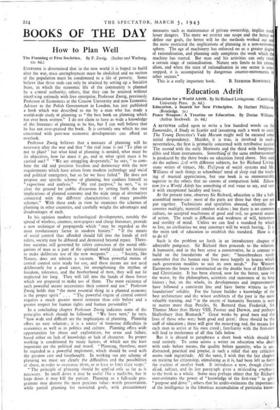BOOKS OF THE DAY
How to Plan Well
EVERYONE is determined that in the new world it is hoped to build after the war, mass unemployment must be abolished and no section of the population must be condemned to a life of poverty. Some believe that these ends can only be attained by setting up a Socialist State, in which the economic life of the community is planned by a central authority; others, that they can be attained without interfering seriously with free enterprise. Professor Zweig, previously Professor of Economics at the Cracow University and now Economic Adviser to the Polish Government in London, has just published a book which was described to me by a man who has made a world-wide study of planning as " the best book on planning which has ever been written." I do not claim to have as wide a knowledge of the literature of planning as he has, but I can well believe that he has not over-praised the book. It is certainly one which no one concerned with post-war economic developments can afford to overlook.
Professor Zweig believes that a measure of planning will be necessary after the war and that " the real issue is not To plan or not to plan? ' but what kind of planning is needed, what must be its objectives, how far must it go, and in what spirit must it be carried out? " " We are struggling desperately," he says, " to com- bine the old and precious freedom and democracy with the new requirements which have arisen from modem technology and social and political emergency, but so far we have failed." He does not propose any specific scheme of planning, but confines himself to " exposition and analysis." " My real purpose," he says, " is to clear the ground for public discussion by setting forth the vast implications of planned economy and the wide range of alternatives connected with the different characteristics of many possible schemes." With these ends in view he examines the schemes of planning in other countries, and carefully weighs the advantages and disadvantages of each.
In his opinion modern technological developments, notably the spread of wireless, cinemas, newspapers and cheap literature, provide a new technique of propaganda which " may be regarded as the most revolutionary factor in modem history." " If the means of social control thus afforded should fall into the hands of evil rulers, society may be debased and destroyed beyond repair. There- fore societies still governed by rulers conscious of the moral obli- gations of man as a part of the spiritual world should not hesitate to make deliberate use of the new weapons." . . . " Society, like Nature, does not tolerate a vacuum. When powerful means of central control exist ready for use, and these means are not used deliberately for a good cause, for strengthening the mythos of freedom, tolerance, and the brotherhood of men, they will not lie neglected for long. They will fall into the hands of those forces which are prepared to make use of them. The mere existence of such powerful means necessitates their control and use." Professor Zweig holds that " the most essential thing in a planned economy is the proper spirit " . . . " The powerful engine of central control requires a much greater moral restraint than ever before and a greater respect for human rights and human personality."
In a concluding chapter Professor Zweig indicates some of the principles which should be followed. " We have seen," he says, " how wide and difficult are the implications of planning. Planning offers no easy solution ; it is a source of immense difficulties in economics as well as in politics and culture. Planning offers wide opportunities for abuse and exploitation, for error and failure, based either on lack of knowledge or lack of character. Its proper working is conditioned by many factors, of which not the least important are the political and moral. " Planning, therefore, must be regarded as a powerful implement, which should be used with the greatest care and forethought. In working out any scheme of planning we must see clearly the difficulties and the possibilities of abuse, in order to overcome them, or at least to limit their scope." " The principle of planning should be applied only so far as is necessary. In small doses it may be usefu! like a medicihe, but in large doses it may kill the patient. Planning as ,a full-scale pro- gramme may destroy the most precious value; worth preservation, while partial planning for restricted goals, with precautionary
measures such as maintenance of private ownership, implies much lesser dangers. The more we restrict our scope and the better define our goals, the better will be the methods worked out and the more restricted the implications of planning in a non-economic sphere. The age of machinery has enforced on us a greater degree of rationalisation, and planning only completes the work which the machine has started. But man and his activities can only reach a certain stage of rationalisation. Nature sets limits to hii ration- alism, and when the state of rationalisation in one sector is over- stepped, it is accompanied by dangerous counter-movements in other sectors."
This is a really important book. B. SEEBOHM ROWNTREE.


























 Previous page
Previous page